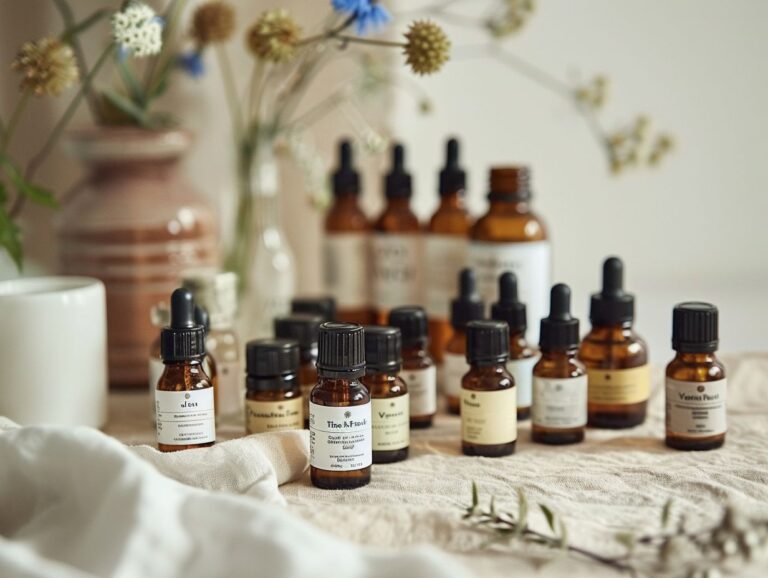What Essential Oil is Good to Inhale
Curious about essential oils and how they can benefit your health and well-being?
Explore the world of essential oils and focus on their inhalation methods. From steam inhalation to diffusion, discuss the various ways you can use essential oils for inhalation.
Discover the benefits of inhaling essential oils, including relief from congestion, improved mood, stress reduction, and immune system support. Also, cover important safety precautions to consider when using essential oils for inhalation.
Find out which essential oils are recommended for inhalation, such as peppermint, eucalyptus, lavender, lemon, and tea tree. Dive into the world of essential oils and unlock their potential for a healthier lifestyle.
Key Takeaways:
What are Essential Oils?
Essential oils are natural aromatic compounds extracted from plants, offering holistic remedies for various wellness aspects. These oils are highly concentrated and contain therapeutic properties that can be beneficial for health and well-being.
These oils are often extracted through methods such as steam distillation, cold pressing, or solvent extraction to ensure the purity of the final product. Once extracted, essential oils retain the characteristic fragrance and healing properties of the plant they are derived from, making them popular in aromatherapy practices.
Aromatherapy, a form of alternative medicine, involves using these plant-derived oils to enhance both physical and psychological well-being. The therapeutic benefits of essential oils range from reducing stress and anxiety to aiding in relaxation and promoting better sleep.
Many essential oils have antimicrobial and antioxidant properties, which can also support the body’s immune system and overall health. Whether used in diffusers, massage oils, or added to baths, these oils have been recognized for their ability to provide a natural way to boost wellness and support holistic health.
How are Essential Oils Used for Inhalation?
Essential oils can be used for inhalation through various methods, allowing the user to benefit from the aromatic compounds present in the oils. Inhalation is a popular and effective way to experience the health benefits of essential oils.
One common and versatile inhalation technique is steam inhalation, where a few drops of essential oil are added to a bowl of hot water, creating steam that is then inhaled. This method is great for clearing the sinuses and respiratory passages.
Direct inhalation involves breathing in the aroma directly from the bottle or by placing a few drops on a tissue or cotton ball. It’s a quick and easy way to enjoy the benefits of essential oils on the go.
Diffusion is another popular method that involves using a device like a diffuser to disperse the essential oil molecules into the air. This method is perfect for creating a calming or energizing atmosphere in a room.
Personal inhalers, such as nasal inhalers or aromatherapy inhaler sticks, provide a more targeted and convenient way to inhale essential oils throughout the day, helping to promote wellness and focus.
Steam Inhalation
Steam inhalation with essential oils is a beneficial method for promoting respiratory health by inhaling the aromatic vapors. This technique helps in clearing the airways and supporting healthy lung function.
When steam is inhaled, the warm, moist air can help soothe irritated nasal passages and throat, making it easier to breathe. This practice is commonly used as a natural remedy for congestion, coughs, and sinus issues.
Essential oils like eucalyptus, peppermint, and tea tree oil are popular choices for steam inhalation due to their antimicrobial and anti-inflammatory properties.
Direct Inhalation
Direct inhalation of essential oils promotes easy breathing and allows for the direct intake of the oil’s therapeutic properties. This method is quick and effective in providing respiratory support.
When directly inhaling essential oils, the molecules are easily absorbed through the respiratory system and quickly enter the bloodstream, resulting in almost immediate benefits. This can be especially helpful during times of congestion or respiratory discomfort. Using a diffuser for direct inhalation is a popular method, allowing easy and continuous access to the essential oils’ benefits.
Some of the best essential oils for direct inhalation include peppermint, eucalyptus, lavender, and tea tree. Peppermint offers a cooling sensation, while eucalyptus is known for its decongestant properties. Lavender promotes relaxation, and tea tree has antibacterial and antiviral effects.
Diffusion
Diffusion is a popular method of using essential oils to disperse their aroma into the air, creating a pleasant and therapeutic environment. A diffuser helps in spreading the essential oil vapours efficiently.
The process of diffusion involves breaking down the essential oils into tiny molecules that can easily evaporate. These molecules are then released into the air, allowing them to be inhaled and absorbed for their therapeutic benefits. Using a diffuser ensures that the essential oil vapours are evenly distributed throughout a room, providing a consistent and long-lasting aroma.
Benefits of using a diffuser for essential oils include purifying the air, promoting relaxation, improving sleep quality, and boosting mood and concentration. By diffusing essential oils, you can enjoy their natural scents without the need for artificial fragrances.
Regarding diffusing essential oils, there are various blends that can enhance different aspects of your well-being. Lavender and chamomile blend is great for promoting relaxation and relieving stress, while peppermint and eucalyptus blend can help clear sinuses and improve focus.
Personal Inhalers
Personal inhalers are convenient tools for respiratory support, allowing individuals to inhale essential oils easily throughout the day. These inhalers provide a portable solution for maintaining wellness.
One of the key benefits of personal inhalers is their ability to deliver targeted respiratory support in a discreet and efficient manner. By using essential oil blends tailored for respiratory health, individuals can experience the soothing and clarifying effects of oils like eucalyptus, peppermint, or tea tree throughout their day. These inhalers can help promote a sense of well-being and relaxation, making them ideal companions for daily use in various environments.
What are the Benefits of Inhaling Essential Oils?

Inhaling essential oils offers a range of benefits, including relieving congestion, improving mood, reducing stress and anxiety, and boosting the immune system. These oils provide effective support for respiratory issues and overall well-being.
When inhaled, essential oils can directly impact the respiratory system by helping clear airways, ease breathing difficulties, and reduce inflammation in the lungs. The aromatic compounds in these oils also have powerful effects on emotions, promoting relaxation and balance. Plus their respiratory benefits, essential oils are known for their antimicrobial properties which can combat harmful pathogens and support the body’s natural defenses. Incorporating essential oils into your daily routine can contribute to improved health benefits physically, mentally, and emotionally.
Relieves Congestion
Inhaling essential oils can help relieve congestion caused by respiratory infections, as the oils possess antimicrobial properties that support the respiratory system. These oils offer a natural remedy for clearing the airways.
One of the key benefits of essential oils in addressing respiratory congestion is their ability to reduce inflammation in the airways, making breathing easier and more comfortable. Eucalyptus oil, known for its decongestant properties, is particularly effective in providing relief from nasal congestion. Another excellent choice is peppermint oil, which not only clears nasal passages but also helps relieve headaches often associated with congestion.
Tea tree oil is favored for its potent antimicrobial properties, helping to combat the underlying causes of respiratory infections. These essential oils can be diffused, added to hot water for steam inhalation, or diluted and applied topically for maximum benefit.
Improves Mood
Essential oils have anti-inflammatory properties that can help improve mood by reducing stress and enhancing relaxation. Inhaling these oils promotes a sense of well-being and emotional balance.
Specific essential oils renowned for their mood-enhancing qualities include Lavender, known for its calming scent that aids in anxiety reduction, and Bergamot, which can uplift spirits and promote feelings of joy.
The anti-inflammatory components in oils such as Frankincense and Chamomile not only benefit physical health but also play a crucial role in soothing emotions and creating a serene atmosphere.
Reduces Stress and Anxiety
Aromatherapy with essential oils is a great way to reduce stress and anxiety, as the aroma of these oils can have a calming effect on the mind and body. Inhaling these oils promotes relaxation and emotional well-being.
Essential oils have been used for centuries to alleviate various ailments, and their therapeutic benefits are well-documented. Studies have shown that certain essential oils like lavender, chamomile, and frankincense are particularly effective in managing stress and anxiety due to their soothing properties.
Lavender oil, for instance, is known for its calming scent which can help in easing nervousness and promoting a sense of tranquility. Chamomile oil is often used to reduce irritability and induce relaxation, while frankincense oil has a grounding effect on the mind, making it beneficial for reducing anxiety.
Boosts Immune System
Inhaling essential oils can boost the immune system due to their antimicrobial properties, which help in defending the body against pathogens. These oils provide essential defense during cold and flu seasons.
When inhaled, these essential oils not only stimulate the immune system but also have a calming effect on the mind and body, reducing stress levels that can weaken immunity. Some popular choices for boosting immunity include
- Tea Tree Oil – known for its powerful antiviral properties
- Lavender Oil – helps in reducing inflammation and supporting overall immune function
- Lemon Oil – boosts white blood cell production, enhancing immunity
Incorporating these essential oils into your daily routine can provide a natural defense against common illnesses.
What are the Safety Precautions for Inhaling Essential Oils?
While inhaling essential oils can offer therapeutic benefits, it is essential to follow proper dilution guidelines to avoid skin sensitivities and reactions. Ensuring the quality and purity of oils is crucial for safe inhalation practices.
Proper dilution guidelines are essential to prevent adverse reactions, especially for individuals with allergies or sensitivities. For those with sensitive skin, using oils that are not properly diluted can lead to irritation or other unwanted effects. It is recommended to always perform a patch test before inhaling or applying essential oils topically. The purity of oils plays a vital role in ensuring inhalation safety.
High-quality oils free from additives and contaminants provide a more pleasant and effective aromatic experience, while minimizing the risk of inhaling harmful substances.
Dilution
Dilution of essential oils is necessary to ensure their safe application for inhalation, especially to prevent skin irritations and sensitivities. High-quality carrier oils are often used to dilute essential oils for safe usage.
Choosing the right carrier oil is crucial for effective dilution. Some popular carrier oils include jojoba, sweet almond, and coconut oil, which not only dilute essential oils but also offer additional nourishing benefits to the skin.
When diluting essential oils, a common guideline is to use a ratio of 2-3% essential oil to carrier oil for topical application. This helps deliver the therapeutic benefits of essential oils without causing any adverse reactions.
Allergies and Sensitivities

Regarding using essential oils, understanding the risks and taking necessary precautions is key to ensuring a safe experience. Allergic reactions can manifest in various ways, such as skin irritation, respiratory issues, or even headaches. It’s important to know that not all essential oils are suitable for everyone, and what works well for one person may not be compatible with another’s body chemistry. For those with known sensitivities, avoiding direct inhalation or using highly concentrated oils is recommended.
To minimize the likelihood of an adverse reaction, diluting essential oils before use can be beneficial. Carrier oils like coconut, almond, or jojoba oil can help reduce the potency of the essential oil while still retaining its beneficial properties. Practicing moderation and following recommended guidelines on usage can also contribute to a safer experience. Always read product labels carefully and opt for high-quality, pure essential oils to minimize the risk of potential allergens or irritants.
Pregnancy and Children
Special care must be taken when using essential oils for inhalation during pregnancy and with children, as certain oils may not be safe for these groups. Following safety guidelines and consulting healthcare professionals is essential in such cases.
During pregnancy, it is crucial to prioritize the well-being of both the mother and the baby, and this applies to the use of essential oils as well. Choosing gentle and soothing oils can offer relaxation and support in a safe manner. Some safe options for pregnant women include lavender, chamomile, and ylang-ylang due to their calming properties.
Regarding children, their smaller bodies can be more sensitive to certain essential oils.
- Certain child-friendly oils such as sweet orange, cedarwood, and frankincense can be safely diffused or diluted for topical use.
- Always remember to research each oil thoroughly and seek guidance from a qualified professional before introducing any essential oils to pregnant women or children.
Quality and Purity of Oils
Ensuring the quality and purity of essential oils is paramount for maintaining inhalation safety, as adulterated or low-quality oils may pose risks to respiratory health. Opting for reputable sources and authentic oils is crucial for safe inhalation practices.
Choosing high-quality essential oils means you are selecting products that have been carefully sourced, extracted, and produced to ensure maximum purity and efficacy. These oils are free from synthetic additives, contaminants, or dilution, making them safe for inhalation without compromising respiratory health.
Quality essential oils undergo rigorous testing and adhere to strict standards, guaranteeing that you receive the purest form of the oil for your well-being.
Which Essential Oils are Good for Inhalation?
Certain essential oils are particularly beneficial for inhalation, such as Peppermint, Eucalyptus, Lavender, Lemon, and Tea Tree oils. These oils are known for their therapeutic properties and are commonly used in aromatherapy for respiratory support.
Peppermint oil is renowned for its invigorating scent that can help clear the airways and promote easier breathing. Eucalyptus oil is excellent for its decongestant properties, making it a popular choice during cold and flu seasons. Lavender oil offers a calming effect, helping to reduce inflammation in the respiratory system. Lemon oil is refreshing and can uplift the mood while supporting respiratory health. Tea Tree oil is well-known for its antibacterial and antiviral properties, making it beneficial for fighting respiratory infections.
Peppermint
Peppermint Essential Oil is a popular choice for inhalation, offering respiratory support and a refreshing aroma. This oil is known for its cooling effect and holistic benefits when used for inhalation.
When Peppermint Essential Oil is diffused, its powerful minty scent can help clear congestion and soothe the respiratory system. The refreshing properties of this oil can provide a revitalizing feeling that uplifts the mood and enhances mental clarity. In holistic remedies, Peppermint Essential Oil is often used to alleviate symptoms of colds, coughs, and sinusitis. Its antibacterial and antiviral properties make it a valuable addition to natural remedies for supporting overall well-being.
Eucalyptus
Eucalyptus Dives Oil is renowned for promoting healthy lungs through its antimicrobial properties. This oil is beneficial for inhalation to support respiratory health and clear airways.
When used in aromatherapy, Eucalyptus Dives Oil can help alleviate congestion, coughs, and other respiratory issues by acting as a natural expectorant. Its antimicrobial attributes make it a popular choice for combating respiratory infections and soothing irritated air passages. Regular use of this oil can aid in reducing inflammation in the respiratory tract and promote overall lung wellness. The refreshing and invigorating scent of Eucalyptus Dives Oil also helps in enhancing breathing and creating a sense of clarity in the airways.
Lavender
Lavender Essential Oil is known for promoting easy breathing and inducing relaxation through its calming aroma. This oil is ideal for inhalation to alleviate stress and enhance well-being.
When Lavender Essential Oil is diffused, its gentle scent can create a serene atmosphere that aids in reducing anxiety levels and promoting emotional balance. Plus its calming effects, this versatile oil can also be applied topically to soothe skin irritations and minor cuts, making it a wonderful addition to your self-care routine.
Lemon

Lemon Essential Oil is a versatile option in the respiratory toolkit, offering various wellness benefits. This oil can uplift mood, provide respiratory support, and purify the air when used for inhalation.
With its refreshing citrus scent, Lemon Essential Oil can be particularly beneficial for addressing congestion and promoting clear breathing. Its natural properties make it a go-to remedy for those looking to enhance their respiratory health. By diffusing Lemon Essential Oil, individuals can create a rejuvenating atmosphere, ideal for relaxation and unwinding after a long day.
Tea Tree
Tea Tree Essential Oil is a natural remedy that can be beneficial for addressing respiratory issues. This oil is known for its antimicrobial properties and is commonly used for inhalation to support respiratory health.
Its antimicrobial properties help in combatting various respiratory infections and illnesses. When diffused, Tea Tree Essential Oil can help clear the airways, providing relief from congestion and breathing difficulties. Its anti-inflammatory effects can reduce inflammation in the respiratory tract, promoting easier breathing.
Frequently Asked Questions
What Essential Oil is Good to Inhale?
Any essential oil can be inhaled, but there are a few that are particularly beneficial for different purposes.
What Essential Oil is Good to Inhale for Relaxation?
Lavender essential oil is known for its calming and relaxation properties when inhaled.
What Essential Oil is Good to Inhale for Congestion?
Eucalyptus essential oil is a great choice for inhaling when dealing with congestion or respiratory issues.
What Essential Oil is Good to Inhale for Focus?
Peppermint essential oil is known for its invigorating and stimulating effects, making it a great choice for inhaling to promote focus and concentration.
What Essential Oil is Good to Inhale for Headaches?
Rosemary essential oil is often recommended for inhaling to help alleviate headaches and migraines.
What Essential Oil is Good to Inhale for Stress?
Bergamot essential oil is known for its soothing and stress-relieving properties, making it a great choice for inhaling to promote relaxation.







